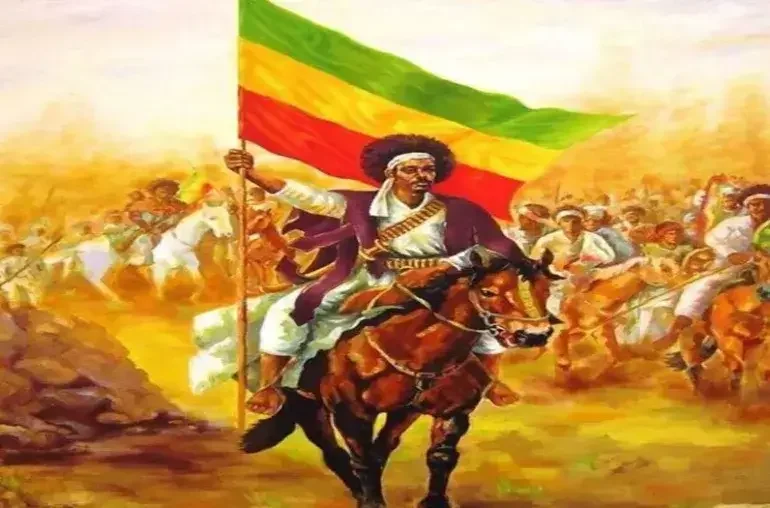Tesfa ZeMichael, B.Phil.

The article is dedicated to the arrested members of the “Adwa bare foot club.”
On March 2, 2024, Abiy’s government prohibited, as it does every year, all Adwa celebrations organized by Ethiopians at Menelik Square and elsewhere. Why is Abiy scared of Ethiopians’ celebrating Adwa? The fact that we have to ask this question shows how far Abiy has gone in his war against Ethiopia and her history.
Historically, Abiy’s war against Ethiopia and her history has a precedent. After Italy’s defeat at Adwa, Italian politicians and intellectuals mounted a sustained campaign aimed at denying the existence of Ethiopia as a distinct nation with its own distinct history. Their angle of attack was ethnicizing the Ethiopian nation and demonizing the Amhara.
Italian fascists and their intellectuals hammered the idea that Ethiopia was not a nation, that she was a collection of ethnicities, colonized and held together by force by the Amhara. They thus planted the seeds of Amhara hatred and ethnic fragmentation. These seeds found a fertile ground in the minds of some Ethiopian intellectuals and students obnubilated by Western social theories.
Thus started the disastrous ethnicization of Ethiopian politics and the persecution of the Amhara as core elements of the ideology and politics of ethnic liberation movements, primarily the TPLF and the OLF.
Abiy Ahmed, who cut his political teeth as a loyal member of the TPLF-organized Oromo ethnic party (ODP), inherited, via the TPLF, the fascist hatred of Ethiopia’s history, of the Amhara, and of the unity of Ethiopia. He has made this triple hatred the Trinity of his political evangelism. Dr. Abiy’s opposition to Ethiopians celebrating the Adwa Victory at the Menelik Square has its roots in this triple hatred.
Neither Ethiopia nor Ethiopian history will succumb that easily to Dr. Abiy’s triple hatred.
Since Emperor Amde Tsion (1314 to 1344), Ethiopian rulers have tried, falteringly to be sure, to create an Ethiopian identity that transcends ethnic particularities. One area where this effort, vacillating as it may be, was visible is in their pursuit to create an army and an administration that are trans-ethnic, thus going beyond multi-ethnicity and sketching the idea that Ethiopians could come together and engage in collective efforts as a trans-ethnic people, i.e., as Ethiopians.
Though almost Ethiopian rulers have aspired to make trans-ethnicity the fulcrum of Ethiopian politics and identity, the first ruler who successfully laid an Ethiopian trans-ethnic modernity-oriented socio-political foundation is Menelik. One proof of this is the battle of Adwa. Menelik succeeded in building an army made up of soldiers and officers who hailed from all corners of Ethiopia, and who identified themselves trans-ethnically. That is, they saw themselves as Ethiopians and not as a collection of ethnic troops. Thus, those who won the Adwa battle did so because they transcended their ethnic particularities and recognized themselves as Ethiopians, i.e., as a people who belonged to the same nation, fighting to defend it.
Menelik was able to achieve this trans-ethnicity by mobilizing the pan-Ethiopian political visions and cultural and psychological resources that animated the long and tortuous history of Ethiopia.
Trans-ethnicity does not mean cancellation of ethnicity; rather it means the recognition that there are universal values, universal principles, and universal goals that transcend ethnic particularities and unite Ethiopians as human beings who participate in a commonly shared historical destiny. To borrow an example from a lecture by an Ethiopian philosopher, this trans-ethnicity is described in Ethiopian culture as የኔ ብጤ (yäne btie), which he interpreted in a Hegelian manner, as, I quote, “that which in me is you, and that which in you is me.”
This shared property—”the you in me” and the “me in you” is the “humanity” or the “universality” that is immanent to each Ethiopian and enables each to go beyond his/her ethnic particularities. It is this universal idea embodied in የኔ ብጤ (yäne btie) that animated the collective effort which made the Adwa Victory possible. It also informed Menelik’s admittedly timid but future-oriented politics of modernization open to all Ethiopians.
In light of the above, we could say that two inter-connected meanings of Adwa scare Abiy. First, the presence of universal or trans-ethnic principles and values in Menelik’s military and political achievements is a mortal threat to his ethnic divide-and-rule regime. Second, the fact that one cannot separate Menelik from this double achievement—his victory over the Italian invaders, and his victory in achieving trans-ethnicity—makes a celebration of Adwa by Ethiopians a popular expression of the rejection of Dr. Abiy’s ethnic politics and Amhara hatred.
As long as Ethiopians understand Menelik and Adwa as inseparable historical phenomena, Dr. Abiy will continue his reactionary effort to split Adwa from Menelik. He will do all he can to erase Menelik from our historical memory as Stalin used to do with those he feared (The Great Soviet Encyclopedia was rewritten regularly to erase the names Stalin feared).
In his attempt to split Menelik from the Adwa Victory and to erase Menelik from the latter, Dr. Abiy is engaged in a two-pronged effort to fossilize Adwa. First, he is reducing the Adwa celebration to the OPP-dominated Defence Forces jamboree. His goal is to empty Adwa of its socio-political trans-ethnic or Ethiopian content. The army that fought and won in Adwa is a trans-ethnic or Ethiopian army; it is not, as Abiy claims, a “multi-ethnic” army, i.e., it is not a collection of ethnic individuals and groups.
Second, he is desiccating Adwa by draining it of its Ethiopian soul and turning it into a historical fossil via a museum that degrades Ethiopian fighters to multi-ethnic groupings. He thus erases the great pan-Ethiopian political achievement of Menelik that made Adwa possible: the foundations of a trans-ethnic or Ethiopian identity.
Menelik successfully formed not only the trans-ethnic army of Adwa but also initiated a trans-ethnic administration and a trans-ethnic or Ethiopian modernity, however incomplete this was, due to historical circumstances. The Adwa victory is the synecdoche of all these historically progressive achievements that are anathema to Dr. Abiy.
Back to our question then: Why is Abiy scared of Ethiopians celebrating the Adwa victory? He is scared because the people’s celebration of Adwa revives the freedom-loving spirit of Adwa and the socio-political trans-ethnicity and progressive vision that made it possible. Adwa teaches us that the politicized ethnic narcissism of Abiy is an orthopedics of the ego that is crippled by Amhara hatred.
Inevitably, the people’s celebration of Adwa exposes the reactionary, divisive, corrupt, exploitative, and dictatorial nature of Abiy’s rule. Thus, no wonder he is scared of Ethiopians celebrating Adwa at Menelik Square and does everything he can to prevent them from doing so.
The reader could perhaps develop additional reasons as to why Abiy is so intent in preventing Ethiopians from celebrating Adwa at Menelik square and other venues of their choice.


